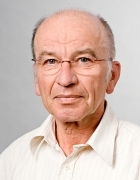
Prof. Dr. Reinhard Schopf
Academic Career and Research Areas
The Chair of Prof. Schopf (b. 1947) explores the field of terrestrial ecology. The main areas of interest are plant-insect interactions, spatio-temporal dynamics and management, as well as habitat selection and association of animal populations. The work of the Chair also covers ecosystem structure and species diversity (including canopy research) and the taxonomy of selected insect families.
Prof. Schopf studied biology at Georg August University in Göttingen. He obtained his doctorate in 1976 and his lecturer qualification in 1987. Also in that year, he was appointed to the Chair of Applied Zoology at the forest science department of Munich’s Ludwig Maximilian University. When the educational facilities at Weihenstephan were re-organized, the Chair was transferred to TUM and renamed Animal Ecology. Prof. Schopf was Editor-in-Chief of the Journal of Applied Entomology from 1995 to 2008.
Key Publications
Dworschak K, Gruppe A, Schopf R: “Mortality and lipid status of the European spruce bark beetle (Ips typographus L.) along an altitude gradient after hibernation“. Mitteilungen der Deutschen Gesellschaft für Allgemeine und Angewandte Entomologie. 2009: 17, 163-166.
Schopf R.: „Forstinsekten unter sich ändernden Umwelt- und Anbaubedingungen.“ Mitteilungen der Deutschen Gesellschaft für Allgemeine und Angewandte Entomologie. 2004; 14: 229-236.
Fischer M, Völkl W, Schopf R, Hoffmann KH: “Age-specific patterns in honeydew production and honeydew composition in the aphid Metopeurum fuscoviride: Implications for ant-attendance”. Journal of Insect Physiology. 2002; 48: 319-326.
AbstractHenn M, Schopf R: “Response of beech (Fagus sylvatica) to elevated CO2 and N: Influence on larval performance of the gypsy moth Lymantria dispar (Lep., Lymantriidae)”. Journal of Applied Entomology. 2001; 125: 501-505.
AbstractGruppe A, Fusseder M, Schopf R: “Short rotation plantations of aspen and balsam poplar on former arable land in Germany: Defoliating insects and leaf constituents”. Forest Ecology and Management. 1999; 121: 113-122.
Abstract